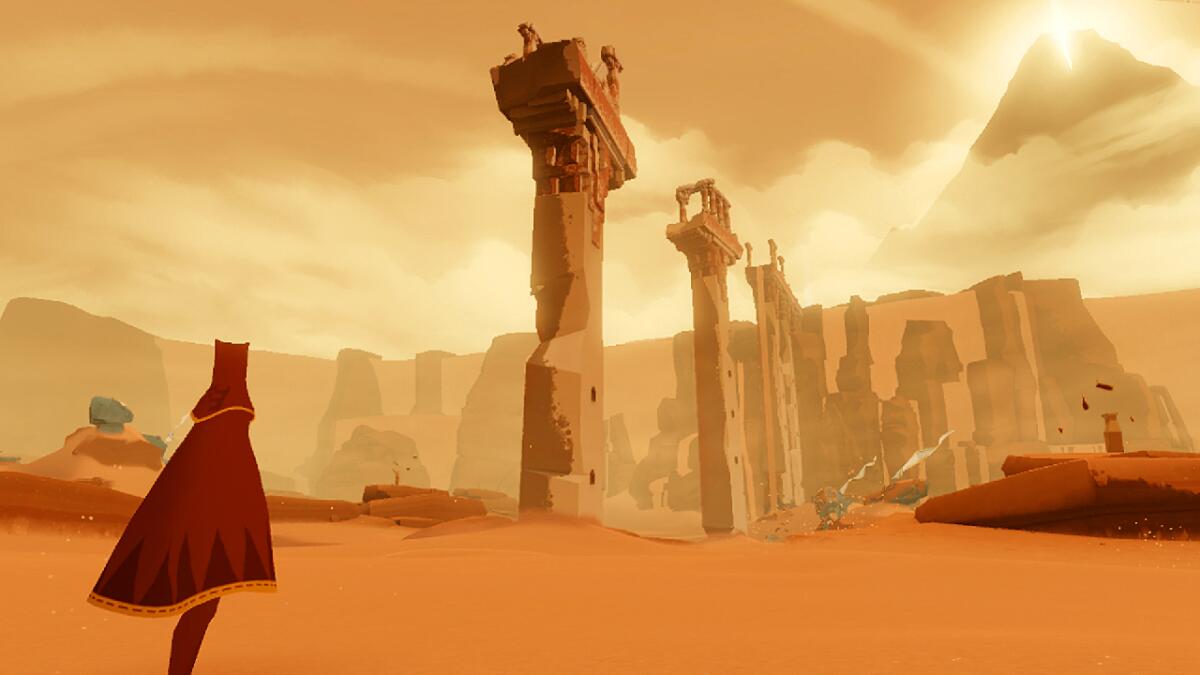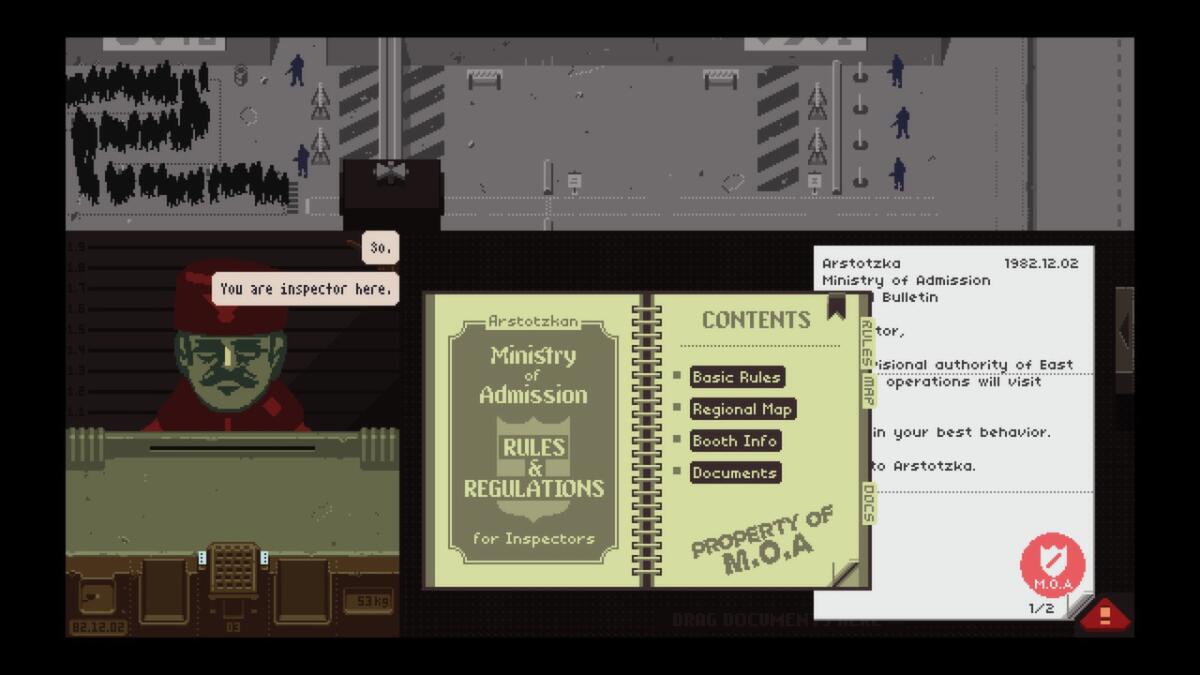Why it matters that the Peabody Awards are recognizing games

- Share via
Growing up, I longed for video games to be taken as seriously as books, film and television. The games “Monkey Island” and “King’s Quest” were as crucial to my early development as the Tolkien books I read on my own and the Dickens books I read in school. For these pivotal interactive texts merged narrative with a participatory curiosity.
Ultimately, they instilled a lifelong love of play.
“It provides a different type of sense memory, and it provides a different way that your brain thinks and your heart beats,” says Diana Williams, CEO/co-founder of Kinetic Energy Entertainment and a former creative executive at Lucasfilm, of the importance of play. The act of play, says Williams, is constantly engaging “the eyes, the heart and the mind” due to the need for an active commitment on the part of the player.
Williams is also the chairwoman of the new Peabody Interactive Board. Over its 80-plus years, the Peabody Awards have focused on honoring thoughtful work in a variety of mediums spanning TV, radio and journalism, but has arguably long been most closely associated with television. On Thursday, the Peabody Awards unveiled its first crop of winners for digital and interactive storytelling, which focused on a variety of foundational texts released prior to 2019, an acknowledgement that the field has long been overlooked by our institutionalized awards bodies.
Thatgamecompany helped launch the indie game movement with ‘Journey.’ Now ‘Sky’ aims to change the entire medium.
In the game space, honorees include “Journey,” “Papers, Please” and “Never Alone.” Taken together, the works emphasize games at their most approachable, each taking risks to expand the audience of players.
“Journey,” for instance, ignited the independent game movement when it was released a decade ago, all while proving to a mass audience that a game could be built on compassion. “Journey” requires us to collaborate, without words, with a stranger as we float in an abstract world.
“So many people say gamers are toxic and nobody wants to talk to them online,” says “Journey” creator Jenova Chen, who describes the game as a “trust exercise” through the journey of one’s life. “I felt that’s not the case. It’s not the gamer’s fault. We are all capable of being mean and a jerk, but we also have kindness in us. It’s the designer’s job to bring out the bright side of humanity. So ‘Journey’ is that game, where we believe people can really bond with another.”

“Papers, Please,” first released in 2013, turned simple puzzles into a game of geopolitical chess, asking players to imagine life as an underpaid, overstressed immigration officer in an Eastern Bloc country. It’s a game that explores the tension between duty and empathy for humanity. “Never Alone,” which came out in 2014, introduced players to little-known tales of native Alaskan culture, all while using simple run-and-jump mechanics to transform players into digital tourists.
“I think people are realizing that games aren’t just trivial amusements,” says Amy Hennig, the president of new media at Skydance Media and a veteran game developer who was one of the architects of the “Uncharted” franchise. Hennig was on the board of Peabody jurors who chose the inaugural interactive winners.
“These experiences have the capacity to make us feel the consequences of choice, the consequences of our actions,” Hennig says. “You can feel in a very visceral way companionship, loss, struggle and liberation. These are elevated experiences. Games can get a bad rap — they’re toys or they only focus on the visceral aspect of the experience — but games can make you feel and cry. I think ‘Journey’ was the first game that actually made me cry. If I had watched that in a passive context, I wouldn’t have had that.”
If there’s a defining medium of our still-uncertain pandemic age, it’s games.
The Peabody recognition is arriving at a time when games are more overtly becoming entertainment IP. This week sees the release of a “Halo” series on Paramount+, “Sonic the Hedgehog” is now a film franchise, “Uncharted” has become a box office success and Netflix’s “League of Legends” series “Arcane” was a top winner at the animation industry’s Annie Awards. It’s a signal that interactive content is entering the mainstream arena in a more overt way than it has in the past.
“We are in a different cultural space,” says Jeffrey Jones, executive director of Peabody, when asked why now regarding the Peabody’s interactive awards.
“There is a recognition, even amongst the old TV types, that the world is different,” Jones says. “I think for me, broader than just the industry, you are seeing this everywhere. Nonprofits are embracing new forms of storytelling. You see it in gaming. You see it in interactive documentaries. If one is aware of what is out there, it just became, as an institution, the time.”

Beyond games, the initial interactive Peabody crop also recognized an assortment of game-related content.
Among the honorees: Cultural criticism site Feminist Frequency, which transcended games media by focusing on the content of games and deeply addressed gender in media; “Always in Season Island,” a multimedia project that utilized game tools to intimately explore issues of race and violence; “Star Wars Uncut,” an online-driven project in which fans re-created the famed space fantasy; and “Notes on Blindness: Into Darkness,” a 360-film project available in virtual reality that examines how the blind can see the world. The full list of winners is available on the Peabody site.
For Chen, founder of thatgamecompany and who began creating “Journey” while he was still a student at USC, he’s hopeful that the Peabody embrace of games will continue to increase respect for the medium. His thatgamecompany studio, which followed “Journey” with the mobile hit “Sky,” has dedicated itself to making approachable games based on collaboration and kindness.
Interactive media, argues Chen, encompasses everything from video games to websites to theme parks, but even today he fears the language surrounding games is one that views the medium with less seriousness than film and television. Ultimately, though, it’s the game designers, says Chen, who are responsible for shifting any perceived narratives.
“Pushing the boundary of the medium is the only way you can help the medium grow beyond its current audience,” says Chen. “That’s my personal dream, to see games replace film as the greatest medium of all time, within my lifetime. Every game we make we’re thinking of how can our game help the medium, help the industry.”
There’s a long history of video game adaptations that walk the line between the dedicated and the uninitiated. For ‘Halo,’ this is the wrong ambition.
More to Read
The biggest entertainment stories
Get our big stories about Hollywood, film, television, music, arts, culture and more right in your inbox as soon as they publish.
You may occasionally receive promotional content from the Los Angeles Times.













